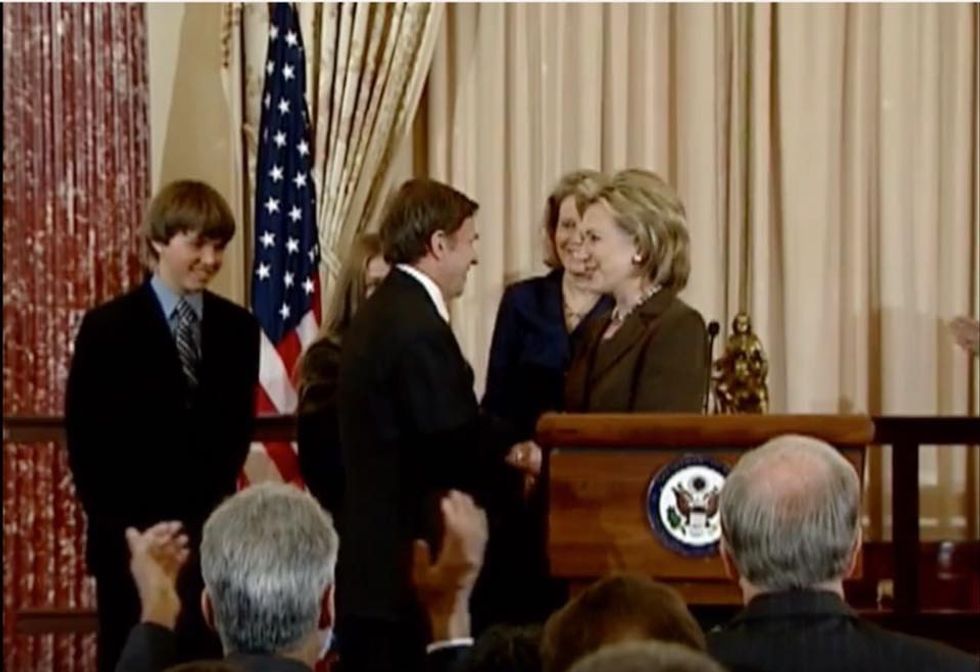Michael Posner served under Hillary when she was Secretary of State. He makes clear Hillary's Commitment to Human Rights and Smart Diplomacy.
Clinton's Commitment, Tenacity and Smart Diplomacy Enabled Real Progress in Human Rights
By Michael Posner
Earlier in June, in San Diego, Hillary Clinton urged Americans to remain "true to our values." She stressed, "We never, ever stop trying to make our country and world a better place," a theme she has sounded often throughout her campaign.
Some will dismiss this as campaign-generated rhetoric. In fact it's a commitment that is central to who she is as a person and what has motivated her decades of public service.
I say this with great confidence because I had a front row seat during Hillary Clinton's tenure as Secretary of State. From 2009 until 2013 I served as the Assistant Secretary of State for Human Rights Democracy and Labor, her point person on issues where America's values are tested every day.

She recruited me to come to the State Department after I had spent more than three decades as a human rights advocate outside of government, including as long-time director of Human Rights First. I came into government believing that other U.S. interests – political, economic and security – often would trump our commitments to human rights. I also had been warned that even getting the attention of senior policy-makers on human rights and democracy issues would be a constant struggle.
My experience working with Secretary Clinton offered a powerful counter-narrative.
From day one I saw Hillary Clinton's personal commitment to human rights, a commitment that flows naturally from her lifetime of advocacy for the rights of women, children and those most vulnerable in our world. This commitment manifests itself in her involvement in individual cases and in advancing broader shifts in policy.
Too often senior officials will pay public homage to promoting human rights in the abstract, but decline to raise specific issues in private meetings with foreign officials. Clinton did just the opposite and because of her commitment, tenacity and smart diplomacy, we made real progress.
In Uzbekistan, for example, in December 2010 she successfully pressed President Karimov for the release of Yusuf Juma, the country's poet laureate who was languishing in a dismal jail. I was with her in that tense meeting in Tashkent and marveled at her tenacious advocacy on Mr Juma's behalf. We had important security issues on the agenda, and it would have been easy to say that raising Juma's case was a bridge too far. But Clinton was determined not just to raise his case but to press successfully for Juma's release.
On a broader scale in 2011 and 2012 we made the release of more than 1100 political prisoners an essential element of U.S. re-engagement with Burma. U.S. policy-makers were eager to take advantage of an opening in diplomatic relations after more than 50 years. The Burmese government, still dominated by the military, was deeply resistant to the release of student activists, labor leaders and others who had opposed its policies.
But on a visit to Burma in December 2011 Secretary Clinton kept this issue on the U.S. agenda and provided the leadership my colleagues and I needed to keep pressing for these releases. By the end of 2012, the government had freed more than 1100 political prisoners, including a number who had been in prison for a decade or more. While other rights challenges in Burma remain unresolved, such as ongoing ethnic conflicts and discrimination against the Rohingya, Secretary Clinton's leadership on the prisoner issue was decisive.
More broadly, Hillary Clinton's lifelong commitment to fighting discrimination motivated her to raise the global bar in fighting attacks on the LGBT community. This was her deliberate commitment from day one and it culminated with her memorable human rights day speech at the United Nations in Geneva in 2011.
As I stood in the back of the room and watched her deliver that powerful speech to more than 1000 diplomats and others, my pride in being a part of the United States government was never greater. In that historic moment Hillary Clinton proclaimed that LGBT rights are human rights, and she announced a broader program to make that commitment a central element of U.S. foreign policy.
These are the types of actions that defined Hillary Clinton's tenure as Secretary of State and it's what she means when she says we must never stop working to make America and the world a better place. And this will be a part of her agenda when she is elected President in November.
###
June 10,2016

